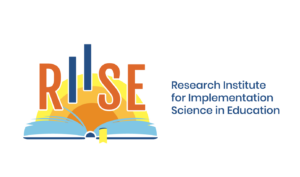Identifying and de-implementing low-value practices: A multi-disciplinary approach for district and school leaders(2025)Journal of School Leadership
Exploring elements of fidelity of a motivational interviewing-based implementation strategy to improve adoption of evidence-based practices(2025)Journal of Educational and Psychological Consultation1-26.
Centering School Leaders’ Expertise: Usability Evaluation of a Leadership-Focused Implementation Strategy to Support Tier 1 Programs in Schools(2024)School Mental Health
Helping Educational Leaders Mobilize Evidence (HELM): The iterative redesign of the Leadership and Organizational Change for Implementation (LOCI) intervention for use in schools(2024)Implementation Research and Practice5:1-14.
Implementation Science in School Mental Health: A 10 Year Progress Update and Development of a New Research Agenda(2024)School Mental Health16:1013–1037.
Not getting better but not getting worse: A cluster randomized controlled pilot trial of a leadership implementation strategy.(2024)Implementation Research and Practice6:
Protocol for a hybrid type 3 effectiveness-implementation trial of a pragmatic individual-level implementation strategy for supporting school-based prevention programming(2024)Implementation Science19(1):2.
The incremental association of implementation leadership and school personnel burnout beyond transformational leadership(2023)School PsychologyAdvance online publication:
Using Stakeholder Input to Guide Data Visualization and Reporting to Promote Evidence-based Practice Use in Public Schools(2023)Global Implementation Research and Applications3 (2):99-111.
Longitudinal Effects of a Motivationally Focused Strategy to Increase the Yield of Training and Consultation on Teachers’ Adoption and Fidelity of a Universal Program(2023)School Mental Health15 (1):105-122.
Teacher attitudes toward evidence-based practices: Exploratory and confirmatory analyses of the school-adapted evidence-based practice attitude scale(2023)Implementation Research and Practice4:
Helping Educational Leaders Mobilize Evidence (HELM): The iterative redesign of the Leadership and Organizational Change for Implementation (LOCI) intervention for use in schools(2023)Implementation Research and Practice
The Interaction Between General and Strategic Leadership and Climate on Their Multilevel Associations with Implementer Attitudes Toward Universal Prevention Programs for Youth Mental Health: A Cross-Sectional Study(2022)Administration and Policy in Mental Health and Mental Health Services Research50 (3):427-449.
Teacher perceptions of implementation climate related to feasibility of implementing schoolwide positive behavior supports and interventions(2022)School Mental Health14 (4):1057-1069.
How low can you go? Examining the effects of brief online training and post-training consultation dose on implementation mechanisms and outcomes for measurement-based care(2022)Implementation Science Communications3 (1):1-15.
Adapting strategies to promote implementation reach and equity (ASPIRE) in school mental health services(2022)Psychology in the Schools59 (12):2471-2485.
A brief online implicit bias intervention for school mental health clinicians(2022)International Journal of Environmental Research and Public Health19 (2):679.
Iterative redesign of a caregiver-mediated intervention for use in educational settings(2022)Autism26 (3):666-677.
School mental health professionals’ knowledge of stereotypes and implicit bias toward Black and Latinx youths(2022)Psychiatric Services73 (11):1308-1311.
A mixed-method study examining solutions to common barriers to teachers’ adoption of evidence-based classroom practices(2022)Psychology in the Schools59 (9):1825-1843.
Construct validity of the School-Implementation Climate Scale(2022)Implementation Research and Practice3:
Expect the unexpected: A qualitative study of the ripple effects of children’s mental health services implementation efforts(2022)Implementation Research and Practice3:
Leading the charge in the education sector: Development and validation of the School Implementation Leadership Scale (SILS)(2022)Implementation Science17 (1):
The Cognitive Walkthrough for Implementation Strategies (CWIS): A pragmatic method for assessing implementation strategy usability(2022)Implementation Science Communications2:1-16.
Protocol for a hybrid type 2 cluster randomized trial of trauma-focused cognitive behavioral therapy and a pragmatic individual-level implementation strategy.(2021)Implementation Science16 (1):
Collaboratively maximizing the impact of human-centered design in psychological and implementation science: Reply to Proctor et al. (2021)(2021)American Psychological Association76 (7):
Study protocol of a randomised trial of Summer STRIPES: A peer-delivered high school preparatory intervention for students with ADHD(2021)BMJ Open11 (8):e045443.
Examining the effects of a brief, group-based motivational implementation strategy on mechanisms of teacher behavior change(2021)Prevention Science22:722-736.
13 Designing Programs with an Eye Toward Scaling(2021)The Scale-Up Effect in Early Childhood and Public Policy: Why Interventions Lose Impact at Scale and What We Can Do About It
Rates of mental health service utilization by children and adolescents in schools and other common service settings: A systematic review and meta-analysis(2021)Administration and Policy in Mental Health and Mental Health Services Research48:420-439.
Exploring individual and organizational mechanisms of implementation of evidence-based practices for the inclusion of elementary students with autism: Study protocol(2021)International Journal of Educational Research108:
Designing the future of children’s mental health services(2020)Administration and Policy in Mental Health and Mental Health Services Research47:735-751.
Implementation determinants and outcomes of a technology-enabled service targeting suicide risk in high schools: Mixed methods study(2020)Journal of Medical Internet Research - Mental Health7(7):e16338.
Rates of mental health service utilization by children and adolescents in schools and other common service settings: A systematic review and meta analysis(2020)Administration and Policy in Mental Health and Mental Health Services Research48:430-439.
Middle and high school student perspectives on digitally-delivered mental health assessments and measurement feedback systems(2020)Administration and Policy in Mental Health and Mental Health Services Research47:531-544.
The influence of a blended, theoretically-informed pre-implementation strategy on school-based clinician implementation of an evidence-based trauma intervention.(2019)Implementation Science14(54):1-16.
Pilot test of an engagement, triage, and brief intervention strategy for school mental health(2019)School Mental Health11:148-162.
User-centered redesign of evidence-based psychosocial interventions to enhance implementation – Hospitable soil or better seeds?(2019)JAMA Psychiatry76(1):3-4.
From evidence to impact: Joining our best school mental health practices with our best implementation strategies(2019)School Mental Health11:106-114.
The role of the outer setting in implementation: Associations between state demographic, fiscal, and policy factors and use of evidence-based treatments in mental healthcare.(2019)Implementation Science14(96):1-13.
Collaborative care to improve access and quality in school-based behavioral health(2019)Journal of School Health89 (12):1013-1023.
The influence of a blended, theoretically-informed pre-implementation strategy on school-based clinician implementation of an evidence-based trauma intervention(2019)Implementation Science14:1-16.
Importance and feasibility of an adapted set of implementation strategies in schools(2019)Journal of School Psychology76:66-77.
Understanding the organizational implementation context of schools: A qualitative study of school district administrators, principals, and teachers(2019)School Mental Health11:379-399.
Adapting a compilation of implementation strategies to advance school-based implementation research and practice(2019)Prevention Science20:914-935.
Mind the Gap: Considering Disparities in Implementing Measurement-Based Care(2019)Journal of the American Academy of Child and Adolescent Psychiatry58 (4):459-461.
A digital feedback system to support implementation of measurement-based care by school-based mental health clinicians(2019)Journal of Clinical Child & Adolescent Psychology48 (Supp 1):168-179.
Impact of Electronic Health Record on quality and fidelity of children’s behavioral health services: Results of a randomized study.(2018)Journal of Medical Internet Research20(6):e10197.
Understanding the organizational implementation context of schools: A qualitative study of school district administrators, principals, and teachers(2018)School Mental Health11(3):379-399.
Assessing organizational implementation context in the education sector: Confirmatory factor analysis of measures of implementation leadership, climate, and citizenship(2018)Implementation Science13:5.
How do school mental health services vary across contexts and provider types? Lessons learned from two efforts to implement a research-based strategy(2018)School Mental Health10(1):134-146.
Predictors of disparities in access and retention in school-based mental health services(2018)School Mental Health10(1):1-11.
The impact of Inter-Organizational Alignment (IOA) on implementation outcomes: Evaluating unique and shared organizational influences in education sector mental health(2018)Implementation Science13(1):13-24.
Confirmatory factor analysis of the Evidence-Based Practice Attitudes Scale with school-based behavioral health consultants(2018)Implementation Science13 (1):1-8.
Importance and feasibility of a revised compilation of implementation strategies to support education sector behavioral health(2018)Implementation Science13:
Social media data for online adolescent suicide risk identification: Considerations for integration within platforms, clinics, and schools(2018)Technology and Adolescent Mental Health157-170.
Fostering SMART partnerships to develop integrated behavioral health services in schools(2016)American Journal of Orthopsychiatry86(2):156-170.
Student perceptions of the acceptability and utility of standardized and idiographic assessment in school mental health(2016)International Journal of Mental Health Promotion
The Contextualized Technology Adaptation Process (CTAP): Optimizing health information technology to improve mental health systems(2016)Administration and Policy in Mental Health and Mental Health Services Research42:394-409.
Modeling the impact of school-based universal depression screening on additional service capacity needs: A system dynamics approach(2016)Administration and Policy in Mental Health and Mental Health Services Research43(2):168-188.
Collaborative care in schools: Enhancing integration and impact in youth mental health.(2016)Advances in School Mental Health Promotion9(3-4):148-168.
A mixed methods study of individual and organizational factors that affect implementation of interventions for children with autism in public schools(2016)Implementation Science11:135.
User-centered design for psychosocial intervention development and implementation(2016)Clinical Psychology: Science & Practice23(2):180-200.
Health Information Technologies – Academic and Commercial Evaluation (HIT-ACE) methodology: Description and application to clinical feedback systems(2016)Implementation Science11(1):128.
Capabilities and characteristics of digital measurement feedback systems: Results from a comprehensive review(2016)Administration and Policy in Mental Health and Mental Health Services Research43(3):441-466.
Client progress monitoring and feedback in school-based mental health(2015)Cognitive and Behavioral Practice
An integrated approach to universal prevention: Independent and combined effects of PBIS and SEL on youths’ mental health(2015)School Psychology Quarterly30(2):166-183.
Evaluation of the Courage and Confidence Mentor Program as a Tier 2 intervention for middle school students with identified internalizing problems(2015)School Mental Health
The Brief Intervention for School Clinicians (BRISC): A mixed-methods evaluation of feasibility, acceptability, and contextual appropriateness(2015)School Mental Health
Taking EBPs to school: Developing and testing a framework for applying common elements of evidence based practice to school mental health(2014)Advances in School Mental Health Promotion7:42-61.
Taking evidence-based practices to school: Using expert opinion to develop a brief, evidence-informed school-based mental health intervention(2014)Advances in School Mental Health Promotion7:42-61.
Using modular psychotherapy in school mental health: Provider perspectives on intervention-setting fit(2014)Journal of Clinical Child & Adolescent Psychology43:890-901.
Implementation science in school mental health: Key constructs and a proposed research agenda(2014)School Mental Health6:99-111.
From distal to proximal: Routine educational data monitoring in school-based mental health(2013)Advances in School Mental Health Promotion6:263-279.
“If it’s worth my time, I will make the time”: School-based providers’ decision-making about participating in an evidence-based psychotherapy consultation program(2013)Administration and Policy in Mental Health and Mental Health Services Research40:467-481.
Patterns and predictors of mental healthcare utilization in schools and other service sectors among adolescents at risk for depression(2013)School Mental Health5:155-165.
Importance and feasibility of an adapted set of strategies for implementing evidence-based mental health practices in schools(In Press)Journal of School Psychology


